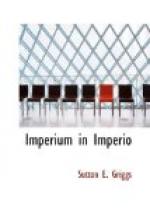“Having thus briefly reviewed our past treatment at the hand of the Anglo-Saxon, we now proceed to consider the treatment which we receive at his hands to-day.
THE INDUSTRIAL SITUATION.
“During the long period of slavery the Negro race was not allowed to use the mind as a weapon in the great ‘battle for bread.’
“The Anglo-Saxon said to the negro, in most haughty tones: ’In this great “battle for bread,” you must supply the brute force while I will supply the brain. If you attempt to use your brain I will kill you; and before I will stoop so low as to use my own physical power to earn my daily bread I will kill myself.’
“This edict of the Anglo-Saxon race, issued in the days of slavery, is yet in force in a slightly modified form.
“He yet flees from physical exertion as though it were the leprosy itself, and yet, violently pushes the negro into that from which he has so precipitately fled, crying in a loud voice, ‘unclean, unclean.’
“If forced by circumstances to resort to manual labor, he chooses the higher forms of this, where skill is the main factor. But he will not labor even here with the negro, but drives him out and bars the door.
“He will contribute the public funds to educate the negro and then exert every possible influence to keep the negro from earning a livelihood by means of that education.
“It is true, that in the goodness of his heart he will allow the negro community to have a negro preacher, teacher, doctor, pharmacist and jackleg lawyer, but further than this he will not go. Practically all of the other higher forms of labor are hermetically sealed so far as the negro is concerned.
“Thus, like Tantalus of old, we are placed in streams of water up to our necks, but when we stoop down to drink thereof the waters recede; luscious fruit, tempting to the eye and pleasing to the taste, is placed above our heads, only to be wafted away by the winds of prejudice, when, like Tantalus we reach up to grasp and eat.
OUR CIVIL RIGHTS.
“An Italian, a Frenchman, a German, a Russian, a Chinaman and a Swede come, let us suppose, on a visit to our country.
“As they draw near our public parks they look up and see placards forbidding somebody to enter these places. They pause to read the signs to see who it is that is forbidden to enter.
“Unable to understand our language, they see a negro child returning from school and they call the child to read and interpret the placard. It reads thus: ‘Negroes and dogs not allowed in here.’
“The little negro child, whose father’s sweaty, unrequited toil cleared the spot whereon the park now stands, loiters outside of the wicker gate in company with the dogs of the foreigners and gazes wistfully through the cracks at the children of these strangers sporting on the lawn.




